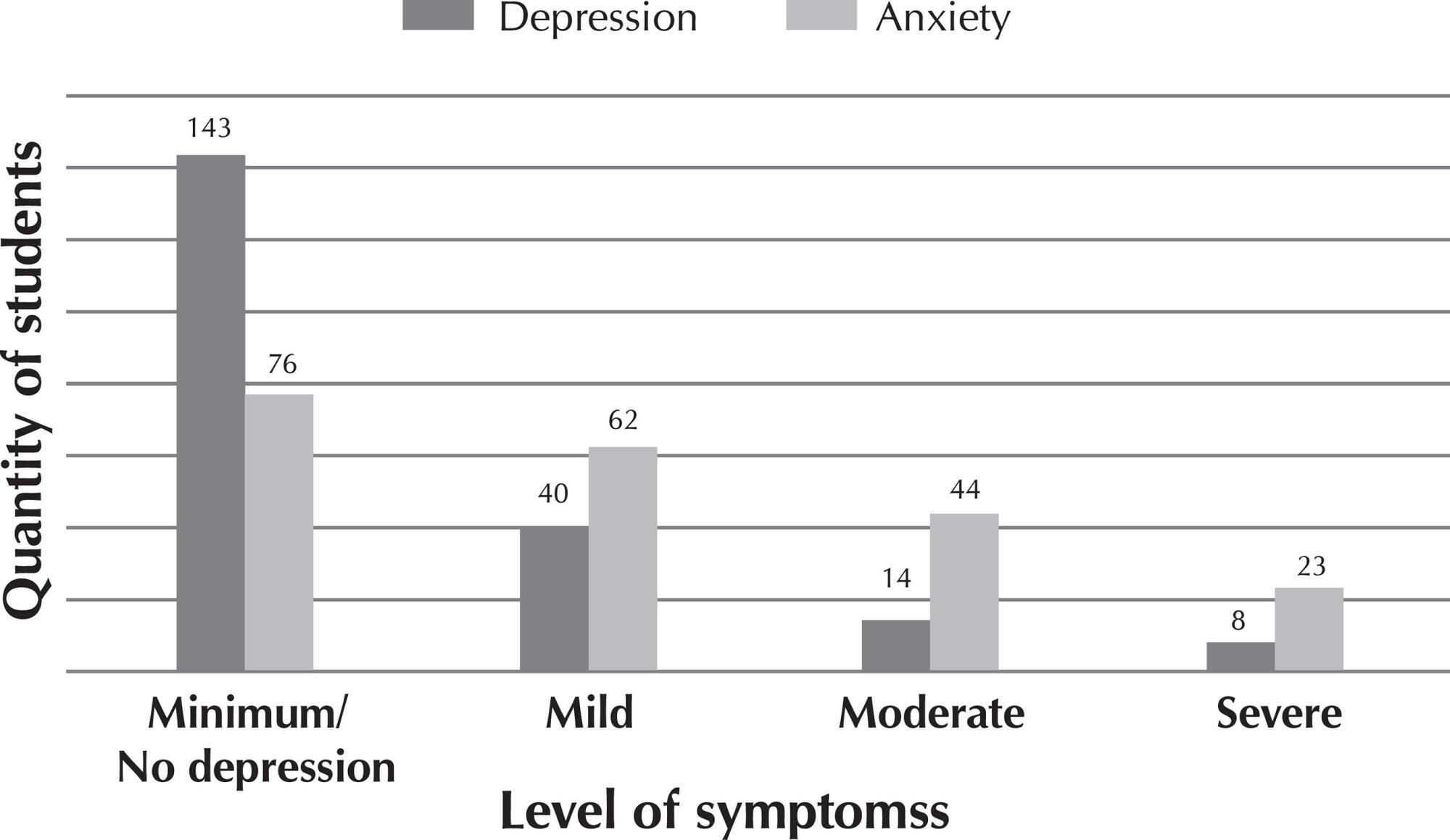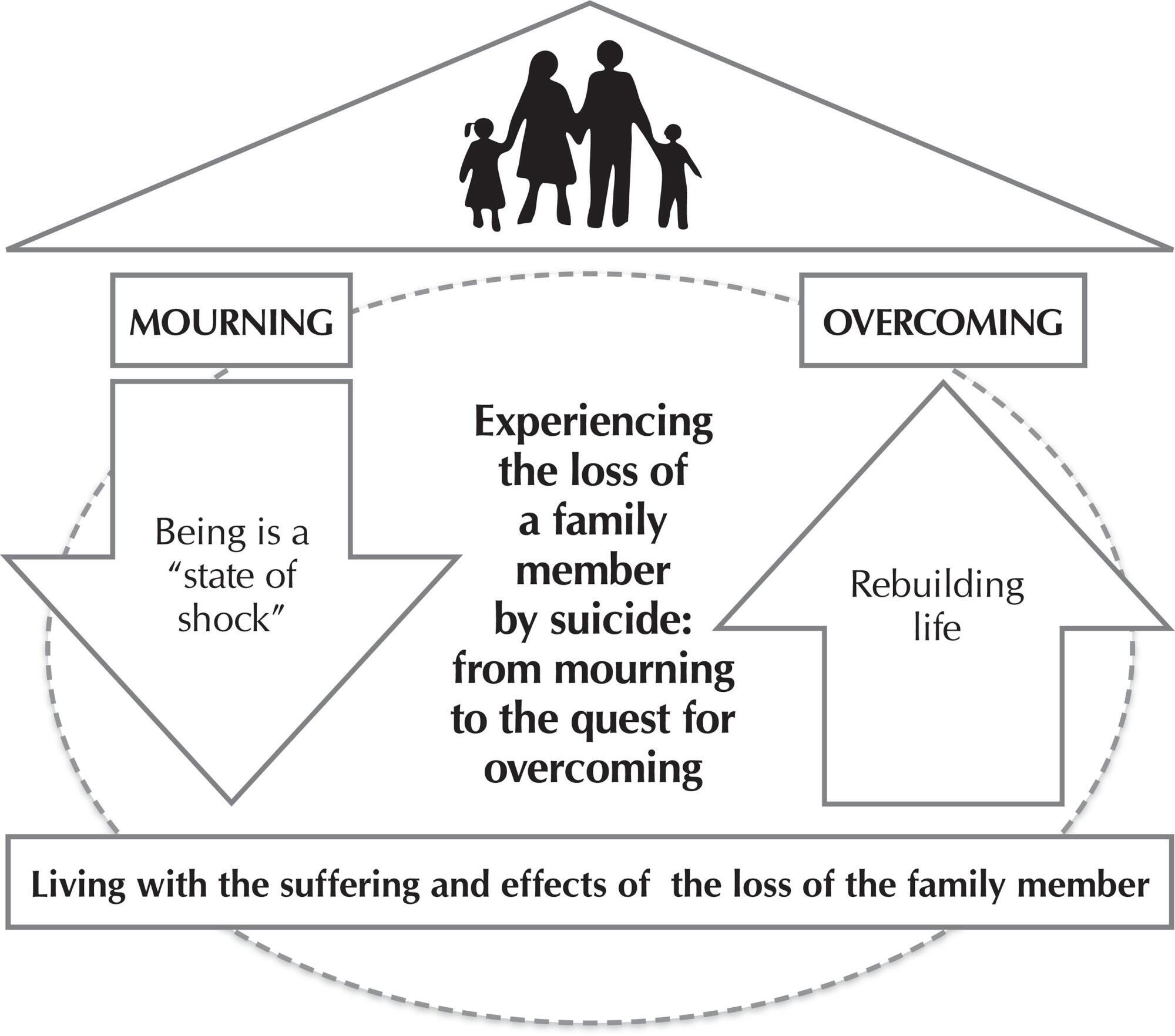-
RESEARCH01-01-2018
Minor psychiatric disorders in nursing: prevalence and associated factors
Revista Brasileira de Enfermagem. 2018;71:2176-2183
Abstract
RESEARCHMinor psychiatric disorders in nursing: prevalence and associated factors
Revista Brasileira de Enfermagem. 2018;71:2176-2183
DOI 10.1590/0034-7167-2018-0028
Views0See moreABSTRACT
Objective:
to investigate the prevalence of Minor Psychiatric Disorders and associated factors in nursing workers.
Method:
observational and analytical sectional study. Data were collected from 285 nursing workers. A questionnaire containing sociodemographic, occupational, psychosocial aspects of work and mental health was used. Bivariate and multivariate analysis were performed by binary logistic regression.
Results:
the global prevalence of suspected Minor Psychiatric Disorders among nursing workers was 32.6%. Higher prevalence rates were found among female, young, married/common-law married individuals, in the nursing assistant/technician categories, with income up to four minimum wages, developing high-demand work with low social support, high effort-reward imbalance, and over-commitment.
Conclusion:
the variables that remained associated with the mental health outcome in the final model were: female gender, married/common-law married, high-demand work, high effort-reward imbalance, and over-commitment.
-
RESEARCH01-01-2018
Prevalence of anxious and depressive symptoms in college students of a public institution
Revista Brasileira de Enfermagem. 2018;71:2169-2175
Abstract
RESEARCHPrevalence of anxious and depressive symptoms in college students of a public institution
Revista Brasileira de Enfermagem. 2018;71:2169-2175
DOI 10.1590/0034-7167-2017-0752
Views1See moreABSTRACT
Objective:
Identify the prevalence of anxious and depressive symptoms and their correlations with sociodemographic and occupational characteristics in university students.
Method:
This is census, cross-sectional and analytical study, developed with nursing students of a federal public university in the Northeast of Brazil in the months of September and October 2016. 205 university students of all the periods of the course attended the study. Beck’s inventories for anxiety and depression were applied.
Results:
Most of the participants were female, single, native of the state capital and living with his parents. The prevalence of depression was 30.2% and of anxiety, 62.9%. Association between the level of depressive symptoms, work, sex and leisure was identified.
Conclusion:
The prevalence of symptoms of anxiety and depression was quite expressive, lacking, thus, more attention to the promotion of mental health of nursing students.

-
RESEARCH01-01-2018
Contribution of transference to the psychiatric nursing process
Revista Brasileira de Enfermagem. 2018;71:2161-2168
Abstract
RESEARCHContribution of transference to the psychiatric nursing process
Revista Brasileira de Enfermagem. 2018;71:2161-2168
DOI 10.1590/0034-7167-2016-0640
Views0See moreABSTRACT
Objective:
to describe the contribution of the concept of transference to the application of the nursing process in the care of patients with psychical suffering.
Method:
Theoretical study, structured from the following question: Is it possible to develop the nursing process in the care of patients with psychical suffering by using transference?
Result:
The patient is considered as a subject of the unconscious and has a demand he/she is unaware of.
Discussion:
The transference guides the nursing process and favors the elaboration of what has no meaning in the symptom.
Final considerations:
As an implication for practice, the nursing process will articulate the transference function through the nursing diagnosis, which will promote the capture of subsidies for the planning and implementation of care, in which the purpose will be the symbolization of the symptom. To highlight speech as a means to therapeutic relation will offer the patients the condition to dictate the pace of articulation between their signifiers, which will dynamically temporalize the process.
-
RESEARCH01-01-2018
Nursing Appointment in Mental Health: experience of nurses of the network
Revista Brasileira de Enfermagem. 2018;71:2154-2160
Abstract
RESEARCHNursing Appointment in Mental Health: experience of nurses of the network
Revista Brasileira de Enfermagem. 2018;71:2154-2160
DOI 10.1590/0034-7167-2017-0678
Views0See moreABSTRACT
Objective:
To know the experience of nurses of the Psychosocial Care Networks on the development of Nursing Appointment in Mental Health.
Method:
Qualitative study, with interview of 20 nurses, through the analysis of the statements in the search of the meaning core.
Results:
was unveiled as meaning core: lack of preparation for Mental Health Care, Non-identification of the work of the nurse in Mental Health; and Performance of Nursing Appointment as bureaucratic fulfillment.
Final considerations:
Nurses understand Nursing Appointment as an individualized and bureaucratic activity, to consider professional regulations, and not as a work process in the multiprofessional work, thus, the Projeto Terapêutico Singular (freely translated as Unique Therapeutic Project) is not cited as a possibility of work process. It was identified necessary space for discussion of actuation and updates of the nurse in Mental Health Care in the health services studied, with emphasis on their performance in a multiprofessional team in consonance with the Mental Health Policy.
-
RESEARCH01-01-2018
Experiencing suicide in the family: from mourning to the quest for overcoming
Revista Brasileira de Enfermagem. 2018;71:2146-2153
Abstract
RESEARCHExperiencing suicide in the family: from mourning to the quest for overcoming
Revista Brasileira de Enfermagem. 2018;71:2146-2153
DOI 10.1590/0034-7167-2017-0679
Views0See moreABSTRACT
Objective:
to understand the family’s experience of losing a family member by suicide.
Method:
study with qualitative approach with reference of the Constructivist Grounded Theory. The theoretical sample consisted of 20 participants, among health professionals and family members of people who committed suicide. Data were collected through intensive and coded interviews from initial and focused coding.
Results:
three categories were obtained: Being in a “state of shock”; Living with the suffering and effects of the loss of the family member; and, Rebuilding life. From the articulation of these categories emerged the phenomenon: “Experiencing the loss of a family member by suicide: from mourning to the quest for overcoming”.
Final considerations:
each category represents a stage in the family’s experience of losing a family member by suicide. The results provide support for suicide prevention and postvention actions developed by health professionals.

-
RESEARCH01-01-2018
Severe Maternal Morbidity: post-traumatic suffering and social support
Revista Brasileira de Enfermagem. 2018;71:2139-2145
Abstract
RESEARCHSevere Maternal Morbidity: post-traumatic suffering and social support
Revista Brasileira de Enfermagem. 2018;71:2139-2145
DOI 10.1590/0034-7167-2017-0271
Views0See moreABSTRACT
Objective:
To assess the relationship of post-traumatic stress symptoms and the perception of social support in women submitted to Severe Maternal Morbidity (SMM).
Method:
A prospective cohort study, with 549 women from public hospitals. The Impact of Events and Social Support scales were used.
Results:
Women with SMM were from the State countryside (p=0.046), with low schooling (p=0.039) and did not work (p<0.001). They presented higher consumption of alcoholic beverages (p<0.001), did not perform prenatal (p<0.001), and were older (28.15 ± 28 years). Women with SMM had higher mean values of avoidance behavior (24.32, SD: 4.16), intrusive thinking (18.28, SD: 3.80), lower social support (0.11, SD: 0.001) with large effect size and lower social support satisfaction (0.69; SD: 0.19), with small effect size.
Conclusion:
SMM is a differential and negative factor for women’s mental health, and social support can favor their coping.
-
RESEARCH01-01-2018
The multiprofessional work in the Psychosocial Care Centers of São Paulo State
Revista Brasileira de Enfermagem. 2018;71:2131-2138
Abstract
RESEARCHThe multiprofessional work in the Psychosocial Care Centers of São Paulo State
Revista Brasileira de Enfermagem. 2018;71:2131-2138
DOI 10.1590/0034-7167-2017-0300
Views0See moreABSTRACT
Objective:
Analyze how professionals understood the multi, inter and transprofessionality and how these practices happened in the CAPS (Psychossocial Care Centers) of São Paulo/SP.
Method:
Qualitative, exploratory, descriptive study, and use of Content Analysis. We interviewed 27 professionals from nine CAPS.
Results:
Organized in two categories: definition of multiprofessional, interprofessional and transprofessional work in Mental Health; and specific aspects of professions and Conceptions about multi, inter and transprofessional teamwork in daily life. There were difficulties in conceptualizing modalities of disciplinary integration, little problematization in the reality of workers, and questions of specific practices of each area. The devices have been problematized, in which the distancing of Public Policies happen.
Final considerations:
There is coexistence of the biomedical, of insane asylum and Psychosocial Care paradigms in the discourses and actions of the teams, to compromise the effectiveness of the Psychiatric Reform. The practice was close to the ideas of integration and of auxiliary interdisciplinarity and not of the effective construction of shared therapeutic knowledge and projects.
-
RESEARCH01-01-2018
Lifeworld: socio-environmental influence on crack cocaine use by teenagers
Revista Brasileira de Enfermagem. 2018;71:2123-2130
Abstract
RESEARCHLifeworld: socio-environmental influence on crack cocaine use by teenagers
Revista Brasileira de Enfermagem. 2018;71:2123-2130
DOI 10.1590/0034-7167-2017-0007
Views0See moreABSTRACT
Objective:
To understand the influence of the lifeworld on crack cocaine use by teenagers undergoing treatment at the Psychosocial Care Center for users of alcohol and other drugs.
Method:
Qualitative research carried out with thirteen teenagers attended at the Psychosocial Care Center for users of alcohol and other drugs, from a municipality in the South of Brazil. The data were collected through semi-structured interviews and the Comprehensive Analysis was carried out from the Phenomenology of the Social World of Alfred Schütz.
Results:
In the lifeworld, there is influence of the community to which the teenager belongs; of the family, by the excess of permissibility and being in an environment of drug use and violence; and the school, where it is influenced by individuals to consume them.
Conclusion:
Elements from the lifeworld influence the teenager for the consumption of crack cocaine, being necessary actions contextualized with their world of life.
Search
Search in:
Nuvem de Tags
Enfermagem (930)Cuidados de Enfermagem (269)Atenção Primária à Saúde (239)Idoso (208)Educação em Enfermagem (151)Segurança do Paciente (150)Saúde Mental (145)Educação em Saúde (139)Estudos de Validação (131)Qualidade de Vida (104)Tecnologia Educacional (100)Promoção da Saúde (99)COVID-19 (91)Criança (91)Família (87)Enfermagem Pediátrica (86)Saúde do Trabalhador (86)Adolescente (85)Saúde Pública (82)Estudantes de Enfermagem (77)












